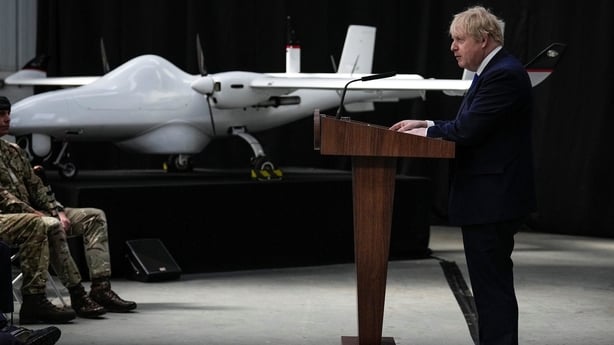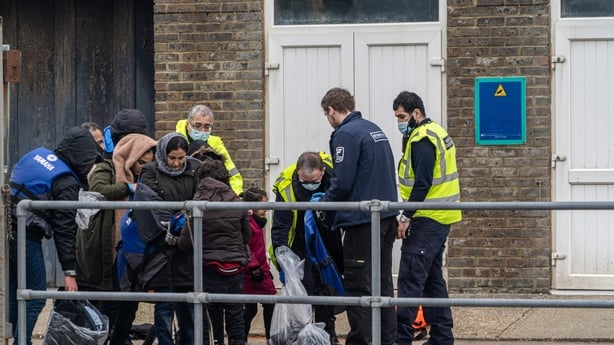The United Nations' refugee agency voiced its strong opposition to Britain's deal to send asylum seekers who cross the Channel to Rwanda.
Britain will send migrants and asylum-seekers who cross the Channel thousands of kilometres away to Rwanda as the government tries to clamp down on record numbers of people making the perilous journey.
"People fleeing war, conflict and persecution deserve compassion and empathy. They should not be traded like commodities and transferred abroad for processing," Gillian Triggs, the UNHCR assistant high commissioner for protection, said in a statement.
UK Prime Minister Boris Johnson said in Dover that "From today ... anyone entering the UK illegally as well as those who have arrived illegally since January 1 may now be relocated to Rwanda."
"Rwanda will have the capacity to resettle tens of thousands of people in the years ahead," Mr Johnson said.
He called the East African nation with a sketchy human rights record "one of the safest countries in the world, globally recognised for its record of welcoming and integrating migrants".
Mr Johnson was elected partly on promises to curb illegal immigration, but has instead seen record numbers making the risky Channel crossing.
He also announced that Britain's border agency would hand responsibility for patrolling the Channel for migrant boats to the navy.
"The Royal Navy will take over operational command from Border Force in the Channel with the aim that no boat makes it to the UK undetected," Mr Johnson said, announcing extra funds for boats, aircraft and surveillance equipment to help detain people-smugglers at sea.

"This will send a clear message to those piloting the boats. If you risk other people's lives in the Channel, you risk spending your own life in prison," he said.
More than 28,000 people arrived in Britain having crossed the Channel from France in small boats in 2021.
Around 90% of those were male and three-quarters were men aged between 18 and 39.
We need your consent to load this rte-player contentWe use rte-player to manage extra content that can set cookies on your device and collect data about your activity. Please review their details and accept them to load the content.Manage Preferences
The Rwanda plan swiftly drew the ire of opposition politicians who accused Mr Johnson of trying to distract from his being fined for breaking coronavirus lockdown rules, while rights groups slammed the project as "inhumane".
Ghana and Rwanda had previously been mentioned as possible locations for the UK to outsource the processing of migrants, but Ghana in January denied involvement.
Instead, Rwanda announced this morning that it had signed a multi-million-pound deal to do the job, during a visit by British Home Secretary Priti Patel.
"Rwanda welcomes this partnership with the United Kingdom to host asylum seekers and migrants, and offer them legal pathways to residence" in the East African nation, Foreign Minister Vincent Biruta said in a statement.
The deal with Rwanda will be funded by the UK to the tune of up to £120 million (€144m), with migrants "integrated into communities across the country," it said.
Refugee Action's Tim Naor Hilton accused the British government of "offshoring its responsibilities onto Europe's former colonies instead of doing our fair share to help some of the most vulnerable people on the planet".
"This grubby cash-for-people plan would be a cowardly, barbaric and inhumane way to treat people fleeing persecution and war," he said.
Detention Action said that those sent there would "likely face indefinite detention under a government notorious for violent persecution of dissent."
"At the same time, the UK currently gives asylum to Rwandan refugees fleeing political persecution," the advocacy group said in a statement.
Mr Johnson criticised the "rank unfairness" of the current asylum system, which he claimed is being exploited by men entering via small boat crossings at the expense of women and children.

He said: "Our compassion may be infinite but our capacity to help people is not. We can't ask the British taxpayer to write a blank cheque to cover the costs of anyone who might want to come and live here.
"Uncontrolled immigration creates unmanageable demands on our NHS and on our welfare state, it overstretches our local schools, our housing and public transport and creates unsustainable pressure to build on precious green spaces.
"Nor is it fair on those who are seeking to come here legally if others can bypass the system. It's a striking fact that around seven out of tern of those arriving in small boats last year were men under 40 paying people smugglers to queue jump and taking up our capacity to help genuine women and child refugees.
"This is particularly perverse as those attempting crossings are not directly fleeing imminent peril, as is the intended purpose of the asylum system. They pass through manifestly safe countries including many in Europe where they could and should claim asylum.
"It's this rank unfairness of a system that can be exploited by gangs which risks eroding public support for the whole concept of asylum."
Many details of the expected announcement, such as whether it would apply just to those who arrived by what the British government calls illegal means, remained unclear.
Enver Solomon, chief executive of the Refugee Council, urged the government to "immediately rethink its plans".
"We are appalled by the government's cruel and nasty decision to send those seeking sanctuary in our country to Rwanda," he said.
"Every day we are hearing the stories of desperate Ukrainian families fleeing war. This is the brutal reality faced by refugees escaping conflicts all over the world, who this Government now wants to treat as no more than human cargo to be shipped elsewhere.
"Offshoring the UK's asylum system will do absolutely nothing to address the reasons why people take perilous journeys to find safety in the UK.
"It will do little to deter them from coming to this country, but only lead to more human suffering and chaos - at a huge expense of an estimated £1.4 billion a year."
Additional reporting AFP

